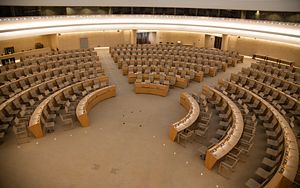A long-awaited report by the U.N. Office of the High Commissioner for Human Rights (OHCHR) has been delivered to the Sri Lankan government. The report, a result of a U.N. Human Rights Council (HRC) resolution passed on Sri Lanka in March 2014, deals largely with abuses by government forces and the separatist Tamil Tigers that occurred during the end of the country’s civil war. The report will be made public imminently.
Sri Lanka’s foreign minister, Mangala Samaraweera, will speak at the HRC today, the opening day of the HRC’s 30th session. He’s expected to discuss Colombo’s plans to deal with reconciliation and “accountability” via domestic means.
On September 17, an important, informal meeting on Sri Lanka will be held at the HRC. During that time, it’s likely that the broad contours of the forthcoming HRC resolution on Sri Lanka, an initiative led by Washington, will be discussed in some detail. The U.S. has made it clear that, unlike the last three U.S.-led HRC resolutions on the war-torn island nation, this one will be in support of the new government.
The U.S. expects to work with Colombo to shape the resolution, but how might this actually play out? What will this collaborative process look like in practice?
The timing of all this leaves much to be desired. The U.S. has indicated that they’ll be looking to the OHCHR report as they craft the new resolution, meaning that crucial debate on this issue will only really start moving now. (The HRC’s 30th session ends on October 2.)
The Obama administration remains eager to show its continued support for Colombo. On the other hand, the U.S. doesn’t want to appear to be completely abandoning the human rights and accountability agenda vis-à-vis Sri Lanka that it’s been pursuing for the past few years.
As a minimum, the U.S. needs to rally support around a strong resolution with clear language on key issues – including accountability, devolution and militarization – and convince Colombo that this is something that they too must support.
Is that likely to happen?
Most signs point towards genuine collaboration in the coming weeks, although it’s hard to know precisely how the negotiation of a collaborative resolution will go – or how hard the U.S. will push to ensure that that the document doesn’t include vague or unspecific language. And what will be the extent of international involvement in Colombo’s domestic process?
Glossing over important issues would be short-sighted and inimical to building a lasting peace in Sri Lanka. It would also give further credence to the claims that American pressure on Sri Lanka about human rights, governance and wartime abuses was regime-specific and that, with two-term president Mahinda Rajapaksa no longer in power, the previously mentioned issues will now be relegated to the backburner.
The next few weeks are going to be interesting.

































